3 Quick Steps to Delete Your Chrome History Right Now
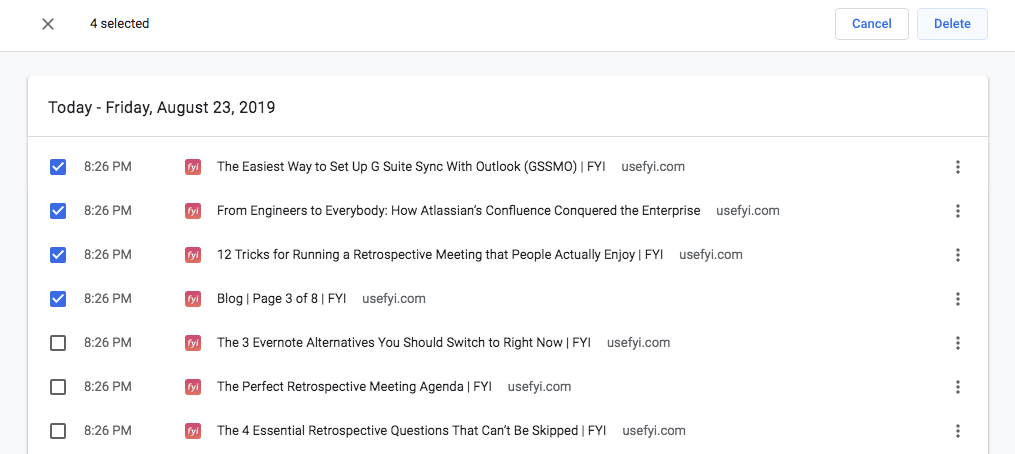
Here’s how to delete your Chrome history, quickly and easily.
Note that deleting your Chrome history doesn’t delete your Google search history. You can do that but it’s a different process. The steps below will delete all the browsing history that’s held in your Chrome account.
Deleting History on Desktop or Laptop
Whatever desktop or laptop OS you have, the method for deleting your browsing history is the same. We’re doing it on a Mac to illustrate.
How to Delete Your Full Chrome History
Deleting everything at once is super simple.
1: Open Chrome, and click the three dots next to your profile image.
2: Select “History” and then “History” again.

3: Select “Clear browsing data” and you’ll be offered the choice to clear your browsing data for a range of dates and times. To delete all your history, choose “all time.”
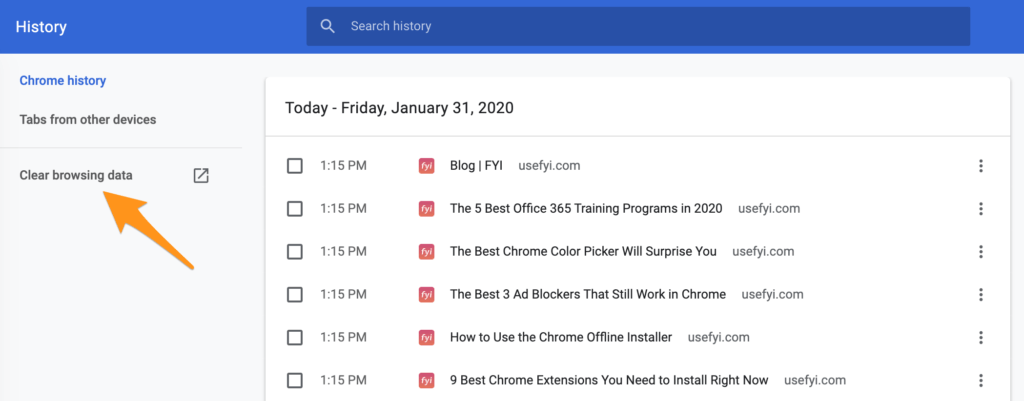
How to Delete a Specific Item
You can also delete specific items from your Chrome browsing history.
Open Chrome and click the three dots next to your profile image. Go to “History” and then “History.”
Check the box next to the items you want to delete. Click “Delete” and the item will get deleted from your Chrome history.

Keep in mind that they aren’t deleted from your Google account’s search history until you do that separately.
Deleting History on iOS
The process for deleting your Chrome browsing history is the same on iPhone and iPad. We’re doing it on an iPhone to illustrate.
Delete Full Chrome History on iOS
1: Open Chrome and select the three dots in the bottom right of the screen. Select History to see your history.
2: At the bottom of the screen, you’ll see “Clear browsing data.” Tap that and make sure only the checkboxes you want are checked; Browsing history is sometimes checked by default, but so are other things like Cookies and Site information that you might not want to erase.
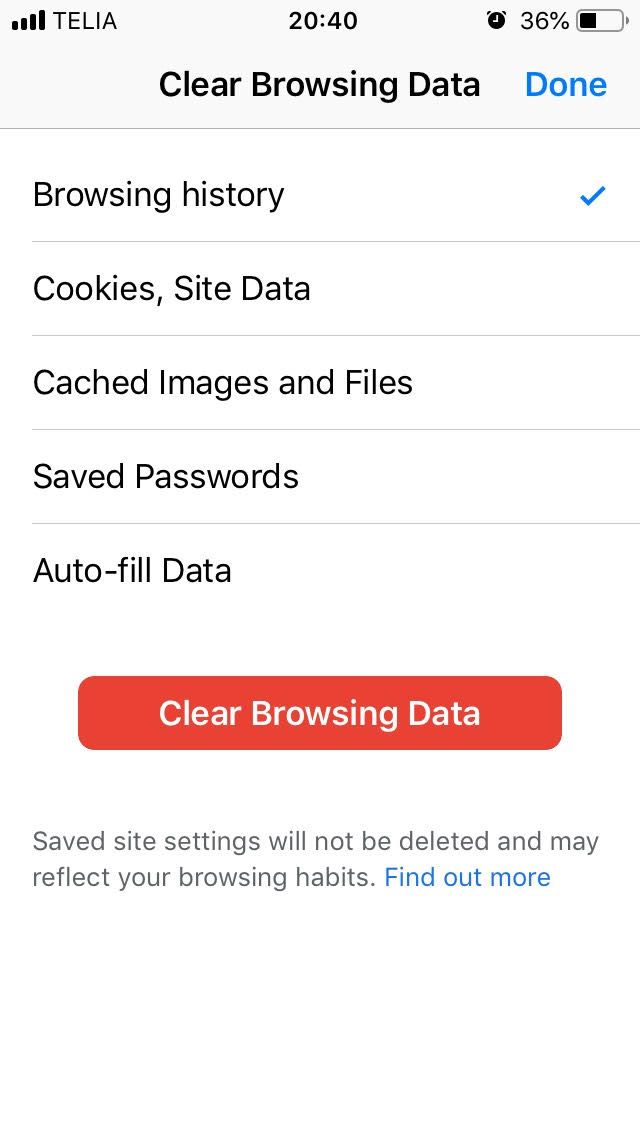
3: Tap Clear browsing data > Clear browsing data, and then tap Done.
Delete a Specific Item on iOS
Open Chrome as before, and go to History. Tap “Edit” and select the item or items you want to remove, then tap “Delete.”
Deleting History on Android
Chrome behaves similarly across Android tablets and phones. We’ve used a Samsung phone to illustrate.
1: Open Chrome, and tap the three dots in the top right hand corner of the screen to see the menu.
2: Choose More > History or find History on the menu.
Some Android devices show the address bar at the bottom; if that’s you, swipe up to see the menu.
3: Tap Clear browsing data at the top of your History screen and check the Browsing history box. Make sure the other boxes, Cookies and site data and Cached images and files, aren’t checked and you’re not deleting anything you want to keep. Select a time period too.
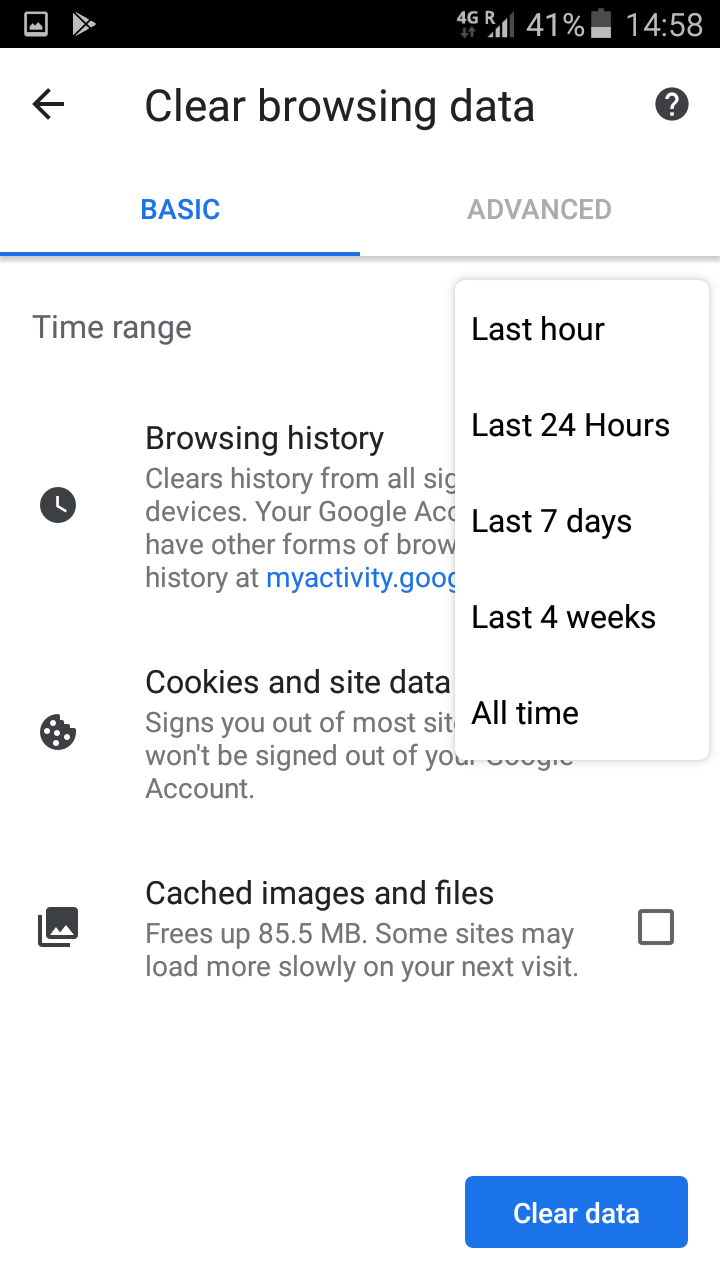
Tap “Clear data” and you’re done.
Delete a Specific Item on Android
Use the same steps as above to get to your History page. Tap the history items you want to erase, then the trashcan logo in the top right of the screen.
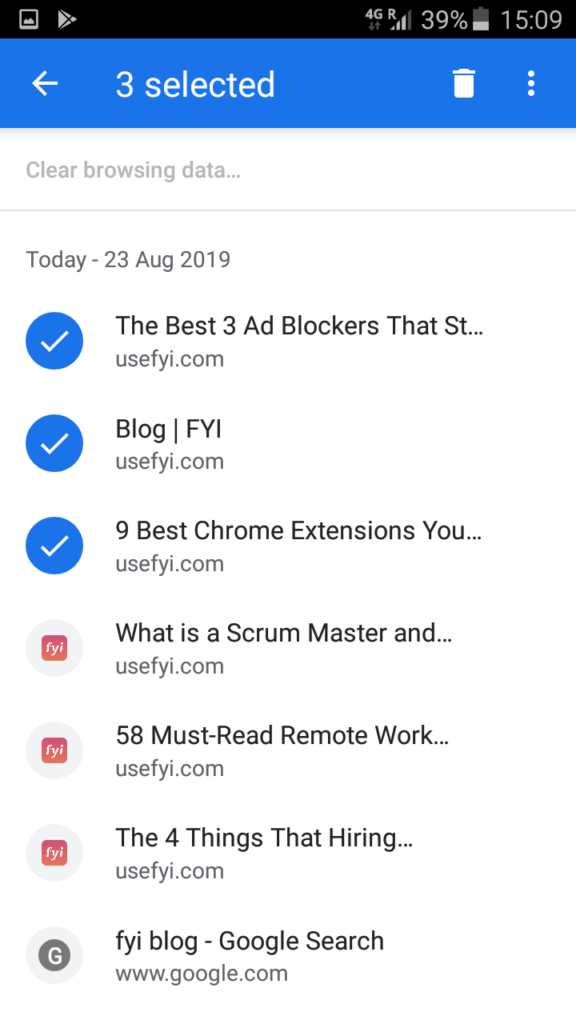
Those items will be erased.
When should you clear your Chrome browsing history?
There are several reasons why it’s a good idea to clear your browsing data.
You logged into a public computer
If you log into a public computer and don’t clear your browser history, it’s probably on display for whoever comes along next. Browsers are often set to record website information and login credentials, which makes life easier most of the time. But you don’t want the next person who wanders up being able to log in to your Facebook or your Gmail account. If you use a public computer, clear the browser cache entirely, including site information and cookies as well as your browsing history, before you log off.
You want a clean slate for search
Chrome tailors your search results to you, based on your past 180 days of browsing history, via an anonymous browser cookie. That means you’re going to see very different search results than someone else with different interests. That’s fine if you’re just using Chrome to search for things for yourself. But if you want to know exactly what natural search results look like to other people, you need to delete your Chrome history.
Chrome also adjusts the autosuggest options it shows you based on your previous browsing history. But if you want a view of autosuggest that doesn’t take account of what you’ve previously done, you’ll need to delete your browsing history to do it. As a marketer, it’s actually quite useful to see what ‘generic’ autosuggest throws back.
Can’t you just use Incognito mode? Nope: autosuggest doesn’t show up at all in Incognito. And studies suggest that you’re getting personalized search results even in Incognito mode)
You’re concerned about security
If someone gets access to your Chrome history and profile, or they use a malicious tracking cookie that follows you around the internet, they can get information that can then be used in spear-phishing attacks on you, your family and your co-workers, or to steal from you directly. And with ad-blocking for Chrome getting tougher, managing your browser history manually is going to get more important.
The less browsing history they have to trawl through, the less data they have to work with. If you’re concerned about this, you should know that your Chrome profile isn’t necessarily secure, and that to improve security you should also delete autofill, site data and cookies.
Can you clear Chrome history automatically?
You can automate clearing Chrome browsing data directly in Chrome settings or via third-party extensions.
Automate deleting browser history on desktop
To set Chrome to delete your browsing history every time you log out of the computer, click the three dots to open the menu in Chrome and select Settings > Advanced > Site settings > Cookies. Here, you’ll find the option to Keep local data only until you quit your browser.
You can’t automate deleting browser history on Android or iOS. And remember, your Google activity history won’t be affected.
Automatically delete Chrome browsing data with third-party extensions
One of the great things about Chrome is how much you can get done with extensions, including managing your browsing history. You can auto-delete Chrome browser history with Auto History Wipe, which lets you automatically delete browser history when Chrome opens rather than when it closes. This means it doesn’t need permission to run in the background and it uses very few resources. It doesn’t always work if your Chrome and Google histories are synched, and can result in a delay of a few seconds before Chrome becomes responsive on opening.
What if you want to set Chrome to delete history weekly, monthly or daily, rather than every time you open or close the browser?
Other Chrome extensions, like History AutoDelete, give you more sophisticated control, letting you delete only certain domains, for instance. It also lets you or auto-delete after a certain number of days.
What to do if you can’t delete your Chrome browsing history
Some recent versions of Chrome have a bug that means they won’t allow you to delete your browsing history. Some individuals find they can’t delete their Chrome history for other reasons. If you are unable to use the standard method to delete your browsing history inside Chrome, try this instead.
For Windows, you can delete your Chrome cache, including browsing data, by going to:
C:UsersUSERNAMEAppDataLocalGoogleChromeUser DataProfile
Replace USERNAME and PROFILE with your computer username and Chrome profile name.
Android users can open Application Manager under Applications in the device’s Settings menu, and then select Chrome and tap Clear Cache.

Some users report that manually clearing cache makes the in-Chrome functionality start working again.
There doesn’t appear to be an equivalent for this in iOS.
Mac users can open a Finder window and go to Go in the top menu, or type Shift+CMD+G, and paste:
~/Library/Application Support/Google/Chrome/Default/Application Cache
This should give you access to the Chrome cache on your Mac’s hard disk and let you erase it manually.
Can you retrieve your Chrome browsing history if you’ve deleted it?
Sometimes you delete your Chrome history, only to realize that it contained the only way to find a resource you forgot to bookmark. If you didn’t delete auto-suggest when you deleted browsing history, you might be able to find what you’re looking for that way. If not, there’s another way.
If you’re signed in to Chrome and Google you should be able to recover your browsing history in Chrome as your Activity history in Google.
Sign in to your Google account.
Click Data & personalization > Activity and timeline > My Activity. If you have previously opted to pause sync or to pause web and app activity, you may still be able to recover Maps and Youtube activity this way.
If you’re not synched with Google, you don’t have much chance to recover your deleted browsing history. On Windows, it can potentially be recovered through the computer’s log files or DNS cache; in Mac, you can try opening Go to folder and going to:
~/Library/Application Support/Google/Chrome/Default
Find the Bookmarks.bak file, then CMD-click the file and select Get info, and delete .bak from Name & extensions.

